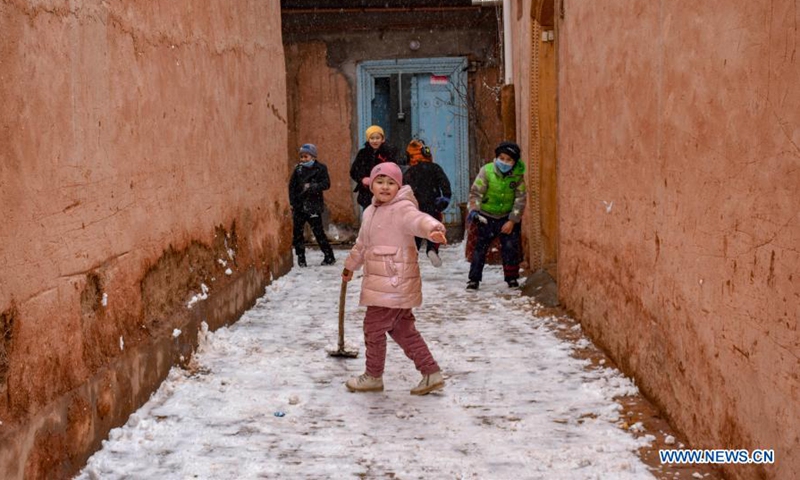US accused of creating 'forced unemployment' in Xinjiang by sanctioning cotton enterprise
By Cao Siqi and Fan Lingzhi Source: Global Times Published: 2020/12/3 21:02:27

Children play with snow in the Ancient City of Kashgar scenic area in Kashgar, northwest China's Xinjiang Uygur Autonomous Region, Nov. 21, 2020. (Xinhua/Gao Han)
Helping people get a job and "forced labor" are two different concepts. Does the US want to create "forced unemployment" and "forced poverty" in China's Xinjiang Uygur Autonomous Region by cracking down on local enterprises through sanctions?
That's what Chinese Foreign Ministry spokesperson asked in response to the US Customs and Border Protection (CBP)'s detention order on cotton products made by the Xinjiang Production and Construction Corps (XPCC).
Some US politicians cooked up the so-called "forced labor" information to limit and suppress Chinese enterprises to contain China. Such a move violates international trade rules and the market economy, and disrupts the global industrial and supply chains, which will damage the interests of countries, including the US, and their enterprises and consumers. It is a typical behavior of harming others without benefiting itself, Chinese Foreign Ministry Spokesperson Hua Chunying said at Thursday's press briefing.
"Some US politicians claim to care about and protect the rights of ethnic minorities in Xinjiang, while suppressing Xinjiang's enterprises with sanctions, thus disrupting the steady development and prosperity of Xinjiang. Doesn't this deprive people of all ethnic groups in Xinjiang of their right to pursue a better life through legitimate work? Is it not to create 'compulsory unemployment' and 'compulsory poverty' in Xinjiang?" Hua asked.
On October 20, the Xinjiang Development Research Center invited experts and scholars to investigate the employment situation of ethnic groups of Xinjiang, who visited more than 70 enterprises, rural labor cooperatives and individual business start-ups in Xinjiang, as well as cities outside the region like Beijing and Tianjin.
They held talks and interviewed more than 800 company managers, employees, the self-employed and ethnic minority employees, and studied 26 government documents issued since 2016 and 48 related academic papers published since 2005. Through comprehensive analysis, the team has concluded that the governments at all levels and the relevant enterprises in Xinjiang and other provinces or cities have actively helped Xinjiang's ethnic minority groups find jobs and fully safeguarded their basic rights such as the labor rights and the right to develop. People of all ethnic groups voluntarily work, choose jobs and start their own business. The so-called forced labor doesn't exist.
China's total cotton output in 2019 was 5.89 million tons, down 213,000 tons or 3.5 percent from 2018, according to data released by the National Bureau of Statistics. Among them, Xinjiang's cotton output accounted for 84.9 percent of the country. Data from the XPCC shows in 2018, the corps produced 2.04 million tons of cotton, up 20.7 percent, accounting for 33.5 percent of China's output and 40 percent of the Xinjiang region's.
"Although Xinjiang's main export destinations are Central Asia and Russia and its exports to the US are relatively small, the US targets this time cover a wide range," Jia Chunyang, an expert at the China Institutes of Contemporary International Relations, told the Global Times.
Even if the US uses the word "withholding," the product will be confiscated at ports, he pointed out. "It is very difficult to prove that there is no so-called forced labor in the production of cotton."
It is evident that "forced labor" is just a cover for the US to crack down on China, and the country will not give China a chance to prove its innocence, the expert said, noting that the XPCC does not need to prove it's innocent.
Jia suggested that Chinese enterprises could consider focusing more on the domestic market and continue to strengthen cooperation with Russia and countries in Central Asia to minimize dependence on the US.
RELATED ARTICLES:
- Is US trying to create 'forced unemployment, poverty' in Xinjiang? Chinese FM asks
- Former Xinjiang deputy governor expelled from CPC for corruption, disloyalty, superstition
- Xinjiang debunks satellite images 'evidence' of 'detention centers'
- Xinjiang offers real-site photos to debunk satellite images ‘evidence’ of ‘detention centers’